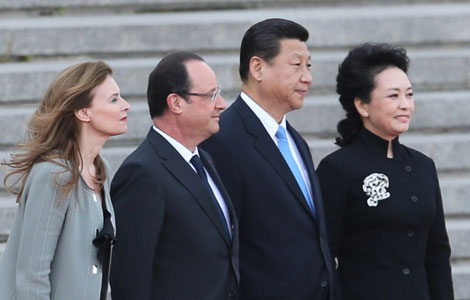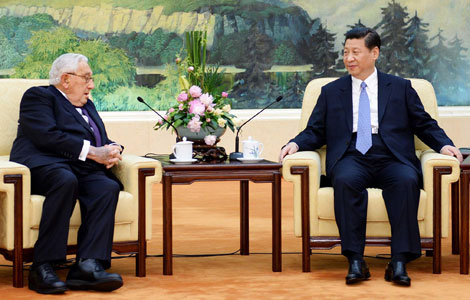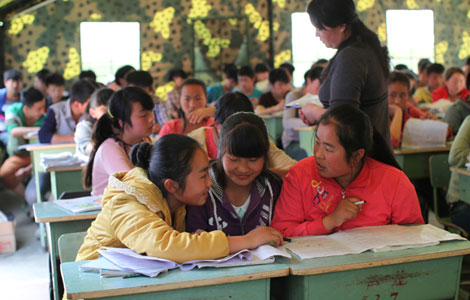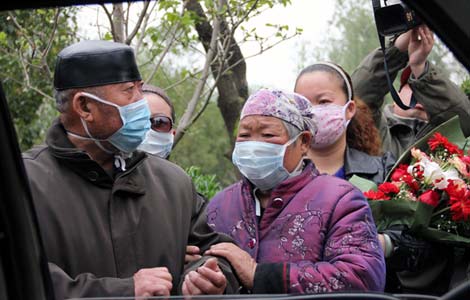Cyber crackdown would benefit both China, US
Updated: 2013-04-26 15:41
By Joseph Boris in Washington (China Daily)
|
||||||||
China would benefit economically by tackling the problems of cyber security and intellectual property protection now straining its relationship with the United States, the State Department's top economic official and a leading Republican senator say.
Both are optimistic, however, about the direction of US-China relations, including cooperation in dealing with nuclear threats from the Democratic People's Republic of Korea and the prospect of joint projects in energy.
Robert Hormats, undersecretary of state for economic growth, energy and the environment, told a gathering of Chinese-American business leaders on Thursday that fears over cyber security and the possible theft of business secrets have made US companies hesitant to invest as much as they would like in the world's second-biggest economy.
"A lot of American companies that might be able to sell high-end products to help China advance in those sectors [are] reluctant to sell them for fear of losing their intellectual property or to invest and develop partnerships with Chinese companies," he said in a panel discussion at the annual conference in Washington of the Committee of 100, an elite group of Chinese-American community leaders.
Such fears also make it harder for Chinese companies to invest in the US, given American concerns that those firms are competitive "because they have taken trade secrets or intellectual property from other companies and used them to compete in the Chinese market", Hormats said.
Although such misdeeds have become "a major source of mistrust" between the countries, Hormats said the number of them is limited. Far larger, he said, are investments in the US economy by Chinese companies, including State enterprises, that don't generate controversy or headlines.
"If China looks at its longterm interest, it will find that protecting intellectual property is very important to its own objectives with respect to its 'going-out' strategy [of investment abroad], with respect to encouraging high-end investment and with respect to being able to sell high-technology products around the world".
Hormats rebutted the idea among some in China that Washington wants to restrict the Asian country's growth.
"The notion the US really wants to contain China's rise economically I regard as very puzzling when you look at the huge increase in Chinese exports to the United States," he said. "there's really no effort to contain China economically or any other way, and even if the United States wanted to, given the economic interaction between China and its neighbors, it's impossible."
Developing new sources of energy is an area with "enormous potential" for US-China cooperation in the medium to long term, Hormats said.
China's urban smog, for example, could be addressed by tapping US experience in environmental regulation and pollution-fighting technologies. Also, a domestic production spree from shale-based natural gas means the US is eager to export gas to China, whose widespread use of coal for electricity accounts for huge emissions of carbon dioxide, a major greenhouse gas that contributes to global climate change.
But, the diplomat stressed, gas is only a "transition fuel", not a long-term replacement for coal. "the ultimate answer is much greater collaboration on solar, on wind, and on nuclear power." Both countries should focus more on these "ultimate renewables" so that their use becomes widespread within 10 to 15 years, he said.
Others on the panel were former US trade representative Carla Hills, former senator and US ambassador to China James Sasser, and Shariff Kan, president of the North American unit of Chinese appliance maker Haier Group. All agreed that a Chinese company's US investment is more likely to succeed if the firm cultivates relationships with state and local leaders, who are often more welcoming of deals from China than is the federal government.
In a later speech at the Committee of 100's conference on Thursday, US Senator Bob Corker praised China for recent changes in its stance on the DPRK and said continued Chinese economic growth is "great for the world" and the US. But he also reiterated complaints about cyber security and IP protection.
A career in business that preceded his election to public office, he said, instilled a pragmatism that led Corker in 2011 to vote against many in his political party on legislation to demand that the US government brand China a "currency manipulator".
"I did not think that was a very intelligent thing to do," said Corker, a Republican from Tennessee who is the ranking Republican on the Senate Foreign Relations Committee.
But "challenges between our two countries" persist, Corker said. While thanking China's new leaders, some of whom he recently met in Beijing, for supporting United Nations sanctions against the DPRK, he said it's imperative that "China play its rightful role" in bringing about denuclearization on the Korean Peninsula.
On cyber security, Corker said, "I'm a little bit appalled by some of the responses that I get when I talk to Chinese leadership" about the issue. He rejects the argument that developed countries once took technology secrets from other countries when they were building their economies.
"I don't think that's an appropriate response and I do think the two countries have got to work in a very different way around the theft" of intellectual property, he said, or the issue will "continue to be a pall over our relationship".
josephboris@chinadailyusa.com
Most Viewed
Editor's Picks

|

|

|

|

|

|
Today's Top News
Phone bookings for taxis in Beijing
Chinese consumers push US exports higher
Seoul delivers ultimatum to DPRK
Boston bombing suspects intended to attack NYC
No let up in home price rises
Bird-watchers undaunted by H7N9 virus
Onset of flood season adds to quake zone risks
Huawei 'not exiting US market'
US Weekly

|

|














